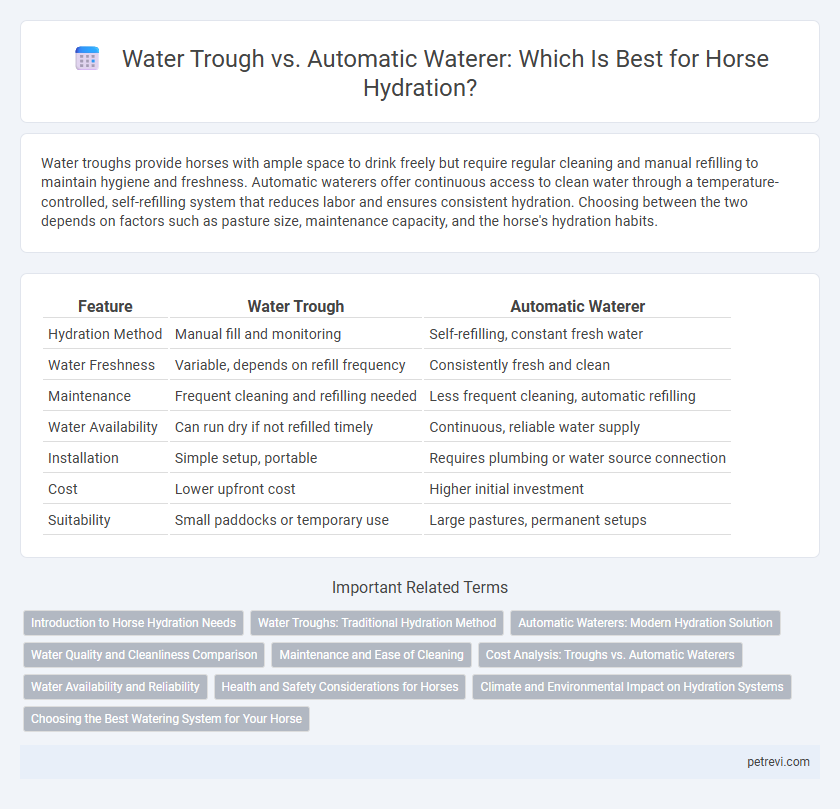Water troughs provide horses with ample space to drink freely but require regular cleaning and manual refilling to maintain hygiene and freshness. Automatic waterers offer continuous access to clean water through a temperature-controlled, self-refilling system that reduces labor and ensures consistent hydration. Choosing between the two depends on factors such as pasture size, maintenance capacity, and the horse's hydration habits.
Table of Comparison
| Feature | Water Trough | Automatic Waterer |
|---|---|---|
| Hydration Method | Manual fill and monitoring | Self-refilling, constant fresh water |
| Water Freshness | Variable, depends on refill frequency | Consistently fresh and clean |
| Maintenance | Frequent cleaning and refilling needed | Less frequent cleaning, automatic refilling |
| Water Availability | Can run dry if not refilled timely | Continuous, reliable water supply |
| Installation | Simple setup, portable | Requires plumbing or water source connection |
| Cost | Lower upfront cost | Higher initial investment |
| Suitability | Small paddocks or temporary use | Large pastures, permanent setups |
Introduction to Horse Hydration Needs
Horse hydration requires a consistent supply of clean, fresh water to maintain optimal health and performance. Water troughs offer a traditional, cost-effective solution but demand regular cleaning and refilling to prevent contamination. Automatic waterers provide constant access with temperature regulation and reduced manual labor, enhancing convenience and horse well-being.
Water Troughs: Traditional Hydration Method
Water troughs provide a traditional and reliable method for horse hydration, often constructed from durable materials like galvanized steel or plastic to withstand outdoor conditions. These containers require regular manual refilling and cleaning to ensure fresh water availability, promoting horse health and preventing bacterial growth. Unlike automatic waterers, water troughs allow for visual water level inspection and adaptability to various stable or pasture settings.
Automatic Waterers: Modern Hydration Solution
Automatic waterers provide horses with a consistent supply of fresh water, leveraging sensor-activated valves that minimize water waste and ensure optimal hydration. These systems reduce labor by eliminating the need for frequent manual refills and maintain water cleanliness through continuous circulation, preventing algae growth and contamination. Advanced models integrate temperature controls to keep water from freezing in cold climates, supporting year-round hydration and improving equine health.
Water Quality and Cleanliness Comparison
Water troughs require frequent manual cleaning to prevent algae growth and bacterial contamination, which can compromise horse hydration quality. Automatic waterers maintain a constant supply of fresh, filtered water by refilling as needed, reducing the risk of stagnant water and improving overall cleanliness. Studies show that horses drinking from automatic waterers have lower exposure to pathogens, promoting better health and hydration.
Maintenance and Ease of Cleaning
Water troughs require regular manual cleaning to prevent algae growth and debris accumulation, demanding considerable time and effort. Automatic waterers offer hands-free refilling and typically feature self-cleaning mechanisms, reducing maintenance frequency and labor. Choosing automatic waterers enhances hygiene and simplifies hydration management by minimizing contamination risks.
Cost Analysis: Troughs vs. Automatic Waterers
Water troughs typically have a lower upfront cost, ranging from $50 to $200 depending on size and material, but require regular manual filling and cleaning, which increases labor costs over time. Automatic waterers, with initial prices between $500 and $1,500, offer convenience and consistent hydration by maintaining fresh water without daily refills, reducing labor expenses and potential health risks. Long-term cost analysis favors automatic waterers for large stables due to saved labor and improved water quality, while water troughs remain economical for small-scale horse care with minimal daily maintenance.
Water Availability and Reliability
Water troughs require regular manual refilling and cleaning to ensure consistent water availability, which can sometimes lead to lapses in hydration if neglected. Automatic waterers provide a continuous and reliable water supply by maintaining a constant water level, reducing the risk of dehydration and promoting better horse health. Reliable hydration systems directly impact a horse's performance, digestion, and overall well-being, making automatic waterers a preferred choice in many equine care settings.
Health and Safety Considerations for Horses
Water troughs provide horses with ample hydration but require regular cleaning to prevent algae and bacteria growth that can lead to infections. Automatic waterers ensure a constant supply of fresh water and reduce contamination risks by limiting exposure to dirt and debris, promoting better health. Monitoring water temperature and quality remains essential to prevent colic and dehydration in equine care.
Climate and Environmental Impact on Hydration Systems
Water troughs require regular manual refilling and cleaning, which can be challenging in arid or freezing climates where water availability is limited or prone to freezing. Automatic waterers provide consistent hydration by maintaining a steady water level and adjusting to temperature fluctuations, reducing water waste and minimizing environmental impact. In regions with extreme weather, automatic waterers improve horse hydration reliability while conserving resources compared to traditional troughs.
Choosing the Best Watering System for Your Horse
Choosing the best watering system for your horse depends on factors such as ease of maintenance, water freshness, and consistent access. Water troughs offer simplicity and large capacity but require frequent cleaning and refilling to prevent contamination. Automatic waterers deliver fresh water continuously with minimal upkeep, ensuring optimal hydration and reducing the risk of waterborne illnesses.
Water Trough vs Automatic Waterer for Horse Hydration Infographic

 petrevi.com
petrevi.com